The only real damage that we suffered from the onslaught of Storm Eunice last Friday was a large tear in the roof of Valentine polytunnel (named after the Valentine's Day storm of 2014), which was flapping wildly, but we have now innovatively patched up using battens, screws and baler twine. We hope this repair will last until the autumn, when we will need to re-skin the tunnel ready for winter. The skin has lasted into its eighth year, so quite good for such an exposed farm.
Tuesday, February 22, 2022
Storm Eunice damage
Veg boxes 18/2/22
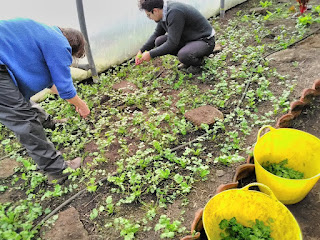 |
| Jos and Faheem picking coriander in the Mothership. |
 |
| Ben picking Chinese cabbage in Nigel. |
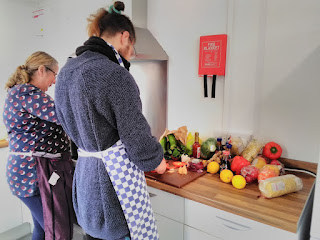 |
| Ali and Joe cooking Thursday lunch in the cabin. |
Despite Storm Eunice we still managed to pick and deliver over 80 veg boxes last Friday (although slightly delayed), with much gratitude to all the pickers and deliverers involved (all performed as safely as possible given the circumstances - most of the storm had passed over by late morning). The boxes contained a selection from:-
- our own mixed salad leaves,
- our own watercress,
- our own Chinese cabbage leaves,
- our own dried ring-of-fire chillies,
- our own rainbow chard,
- our own red Russian kale,
- our own coriander,
- local organic Carolus potatoes,
- local organic leeks,
- local organic celeriac,
- and local organic cauliflowers.
Farm shop sign
Tuesday, February 15, 2022
Diana, Coral and Charlie
Three of our winter volunteers have recently completed their time with us and moved on with their lives, and we would like to thank them for their help this winter, and wish them well for their futures. Diana was a local volunteer who has now left the area, while Coral and Charlie were live-in WWOOFers for one month. Many thanks to all!
Cob barn deconstruction
In 2014/15 we hosted a series of workshops on sustainable building here on the farm, over the course of which a new cob barn was built in the northwest corner of Home Field, primarily as an agricultural building. Unfortunately, the roof had issues from the start, which lead to it sagging and becoming unstable, so we had to stop using the building. The damp from the roof then got into the walls. Periodically we tried to resolve these issues, and in 2019/20 we even shored up the collapsing walls with reinforced concrete (as part of a Rebuild Southwest training programme) in a last desperate attempt to prevent total collapse, but none of this was enough. So we took the very painful decision to deconstruct the building, which happened over the course of last week, and sort the materials into piles for further use or disposal.
 |
| The best part of the cob barn prior to deconstruction, showing the patched-up roof. |
 |
| Inside the cob barn prior to deconstruction. |
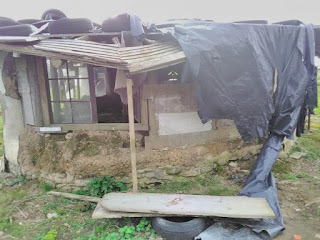 |
| The north side of the cob barn prior to deconstruction. |
 |
| Half down. |
 |
| The last wall standing. |
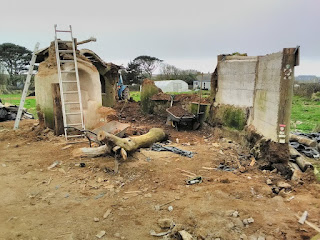 |
| Showing the huge lumps of reinforced concrete in the walls, which didn't stop further deterioration, and caused problems during deconstruction/disposal. |
 |
| Almost there on day 4. |
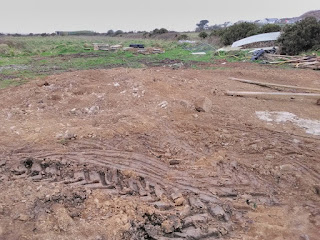 |
| The site afterwards. |
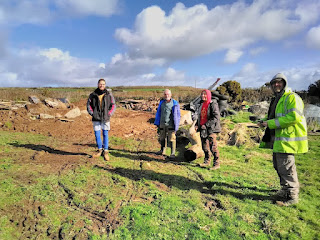 |
| Part of the cob barn deconstruction team - Joe, Paul, Jo and David. |
Many thanks to all the volunteers who assisted during this unfortunate but essential exercise.
We are now in the first stages of discussion and exploration about if/how/why to replace the barn with a longer-lasting "community structure" of some description.
Friday, February 11, 2022
Bird flu update
The first cases of bird flu in this part of Cornwall were recorded recently when dead sea-gulls were found on the beach at Long Rock near Penzance. This is about 10 miles from us. Our flock has been "locked-down" inside their sheds and netted runs since 29th November last year, and we are hoping to be able to let them out into a field on 21st March, as that is the 16-week limit for "free range" hens and eggs. The netted runs we built have become a muddy mess in the past ten weeks, so today we have taken them down and reinstalled them at 90 degrees, allowing our hens access to the fresh green grass which they have been craving in their diet. We've also installed simple pulley systems on their pop-holes to allow us to open and close the sheds without entering their runs (using pieces of electric pig-fence tensioning systems).
 |
| Happier chickens on fresh green ground. |
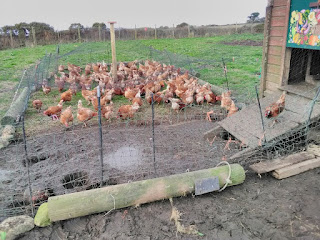 |
| Showing where the run used to be until we moved it, and where it is now - quite a contrast. |




